

Global Citizenship blog
 Global Citizenship teaching and learning within ‘Curriculum for Excellence’ can benefit from the thoughtful, selective and informed use of Film. Many teachers will have their students watch chosen extracts or entire movies, films picked carefully which cover themes or narratives which will add to the knowledge and understanding of their students. Working with films also enables students to acquire and deepen skills in research, critical analysis and media literacy, helping them to handle different sources of information, form and communicate informed viewpoints.
Global Citizenship teaching and learning within ‘Curriculum for Excellence’ can benefit from the thoughtful, selective and informed use of Film. Many teachers will have their students watch chosen extracts or entire movies, films picked carefully which cover themes or narratives which will add to the knowledge and understanding of their students. Working with films also enables students to acquire and deepen skills in research, critical analysis and media literacy, helping them to handle different sources of information, form and communicate informed viewpoints.
In Scotland we are lucky to have a number of cinema festivals and venues which enable teachers to work with films about global citizenship issues and films from other countries which offer different and diverse viewpoints.
The Take One Action film festival begins today in Edinburgh and Glasgow and runs for the next two weeks. It offers a wide range of movies about global issues such as land, poverty, climate change, food, conflict and much more. There are documentaries and dramas, and many showings are complemented by themed audience discussions, interviews with film-makers and NGOs, etc. I’ve picked out just three of the films on offer, which may have particular use in school: ’Fezeka’s Voice‘, about an inspirational teacher and musicians from South Africa; ‘Blood in the mobile’, about child labour and mineral extraction in Congo; and ‘There once was an island’, about climate change in Polynesia. For full details of the films show dates and associated activities, check the Take One Action website.
Independent Film venues often host parts of such annual film festivals, but also run their own extensive programmes of film showings which expose teachers and students to alternative perspectives. Glasgow Film Theatre, Edinburgh’s Filmhouse, and Dundee Contemporary Arts are all active in this regard, and teachers should contact their nearest venue for advance programme details which may include special showings for schools (with associated educational elements) or teacher CPD sessions.
These independent venues are also imaginative in working with partners to develop their own festivals and seasons of films which focus on a particular theme. Two examples:
- Filmhouse hosts the ‘Africa in Motion’ festival in early November, running a series of films and events which deal with the lives and issues of young people in Africa. The films include shorts, animations, fiction and documentaries.
- The Discovery Film Festival takes place at DCA in Dundee, and its schools programme runs from 22nd October to 6th November. There are teacher CPD sessions alongside the film programme.
Many venues also take part in National Schools Film Week, which for Scotland in 2011 will be from 27th October to 4th November.
More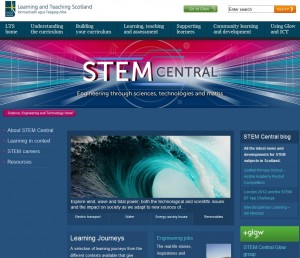 This significant new online resource from Learning and Teaching Scotland is packed with ideas, resources and links to help you create learning experiences that bring STEM (Sciences, Technologies, Engineering and Maths) subjects to life for learners. Using the focus of engineering, the STEM Central website offers stimulating and challenging interdisciplinary experiences based around contexts related to sustainability such as electric transport and renewable energy.
This significant new online resource from Learning and Teaching Scotland is packed with ideas, resources and links to help you create learning experiences that bring STEM (Sciences, Technologies, Engineering and Maths) subjects to life for learners. Using the focus of engineering, the STEM Central website offers stimulating and challenging interdisciplinary experiences based around contexts related to sustainability such as electric transport and renewable energy.
All the teaching ideas are linked to specific Curriculum for Excellence experiences and outcomes at third and fourth levels, and the learning journeys are supported with videos, activities and links to additional resources and information. To help inspire your learners, there are also links to careers resources and the real-life testimonies from contemporary Scottish engineers.
It enables you to explore the key learning and teaching approaches that can support STEM learning and meets the aims of the ‘Science & Engineering 21 - An Action Plan for Education’ by highlighting the big issues around science today.
Visit the STEM Central website at http://www.ltscotland.org.uk/stemcentral/
More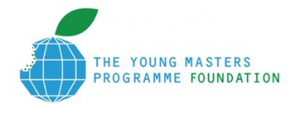 The Young Masters Programme on Sustainable Development is a global web-based education and learning network. It is free of charge and is open to students (16–18 years old) and their teachers from all over the world.
The Young Masters Programme on Sustainable Development is a global web-based education and learning network. It is free of charge and is open to students (16–18 years old) and their teachers from all over the world.
Extensive online teaching material gives the students a thorough understanding of sustainability issues and solutions. Challenging assignments in their local communities inspire students and enhance their interest in the studies.
Teachers and students from all corners of the world are brought together in virtual classrooms to compare and discuss their results, and to receive and give feedback on their assignments. In the online community, students learn from each other by sharing first-hand information with their peers in different countries. They also gain an understanding of common sustainability challenges and what different local perspectives and solutions exist.
The Young Masters Programme has been developed at the International Institute for Industrial Environmental Economics (IIIEE) at Lund University in Sweden and is an integral part of the UN Decade of Education for Sustainable Development (DESD, 2005–2014) led by UNESCO. The programme is managed by an independent, non-profit foundation, the Young Masters Programme Foundation (YMPF). Close ties and collaboration with Lund university and the international scientific community ensures that the basic course content is reliable and in concordance with the latest scientific knowledge.
Find more information about the YMPF at www.ympfoundation.org
Enrol in the programme by visiting http://www.goymp.org/
More Talking to schools and teachers on a frequent basis, we often come across examples of innovative approaches to learning about global citizenship. In recent months I’ve seen more teachers introducing their pupils to the concept of micro-financing, a way of lending small amounts of money to entrepreneurial individuals in developing countries to help them move out of poverty. So a school class might raise a modest sum through charitable efforts, and then commit that money in small loans to local people in nations in Africa, Asia, etc. Loan repayments can be reinvested with other individuals. Involvement in such a programme can help young people research and understand life and poverty in other countries, and make a direct contribution towards improving the lives and communities of other people. The young students also learn more about financial education and planning and about enterprise. Here are two examples.
Talking to schools and teachers on a frequent basis, we often come across examples of innovative approaches to learning about global citizenship. In recent months I’ve seen more teachers introducing their pupils to the concept of micro-financing, a way of lending small amounts of money to entrepreneurial individuals in developing countries to help them move out of poverty. So a school class might raise a modest sum through charitable efforts, and then commit that money in small loans to local people in nations in Africa, Asia, etc. Loan repayments can be reinvested with other individuals. Involvement in such a programme can help young people research and understand life and poverty in other countries, and make a direct contribution towards improving the lives and communities of other people. The young students also learn more about financial education and planning and about enterprise. Here are two examples.
St Vincent’s primary school in East Kilbride, South Lanarkshire, took part in a challenge activity with the Wild Hearts charity. A video interview with three pupils describes the process and what they learned from the experience.
And the Kiva not-for-profit organisation in the USA is used by other Scottish schools as a channel to support local development. Langlands primary school from Angus were an early adopter of this approach. The recent report of the Curriculum for Excellence ‘Modern Studies Excellence Group’ comments on Kiva as an example of real-world citizenship action.
Nick
More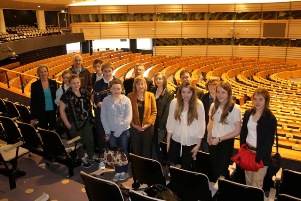 Congratulations to the two students from Kings Park secondary school in Glasgow who won this year’s ‘Talk your way to Brussels’ speaking competition. This annual event is organised by the Scottish European Educational Trust (SEET), and sponsored by IBM, and requires young Scots to demonstrate their ability with a foreign language.
Congratulations to the two students from Kings Park secondary school in Glasgow who won this year’s ‘Talk your way to Brussels’ speaking competition. This annual event is organised by the Scottish European Educational Trust (SEET), and sponsored by IBM, and requires young Scots to demonstrate their ability with a foreign language.
Mark Pentleton of Radio Lingua supported the competition by training the student teams in how to make a video diary of their time at the finals in Brussels, providing participants with a download of the company’s web based language courses, and offering ipods for the winners. The finalists produced a promo video about their visit to the European Parliament with MEP David Martin.
More This is a 3 year project funded by the European Union, promoting learning, dialogue and action on climate change through linking 11-19 year olds in primary and secondary schools, as well as youth groups in the EU (UK, Netherlands and Bulgaria) with those in Africa (Malawi, Senegal and Kenya).
This is a 3 year project funded by the European Union, promoting learning, dialogue and action on climate change through linking 11-19 year olds in primary and secondary schools, as well as youth groups in the EU (UK, Netherlands and Bulgaria) with those in Africa (Malawi, Senegal and Kenya).
Participating schools and youth groups will learn about climate change using specifically designed Learning Resources and a user-friendly, interactive web platform. The Learning Resources include flexible lesson plans, teaching resources and supplementary worksheets for young people, to explore the human challenges presented by climate change and the effect it is having on the lives of real people around the world.
Using the web platform, young people will connect with one another via messaging, blogging and group discussions to exchange their ideas and experiences of climate change, and collaborate on projects and campaigns locally, nationally and internationally. By discussing climate change with their peers abroad, young people will gain insight into cultural differences, personal similarities and what they can do to make positive changes for the future of the planet.
Find out more at: http://www.mtl-cec.org/
More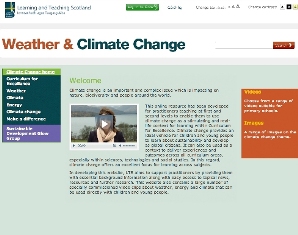 Learning and Teaching Scotland has launched a significant new online resource for practitioners. Our new Weather and Climate Change website supports the development of children and young people as global citizens and comprises over 50 high quality videos as well as images, background information and extensive links to other online resources.
Learning and Teaching Scotland has launched a significant new online resource for practitioners. Our new Weather and Climate Change website supports the development of children and young people as global citizens and comprises over 50 high quality videos as well as images, background information and extensive links to other online resources.
The Weather and Climate Change website is now live at http://www.LTScotland.org.uk/weatherandclimatechange/
This new online resource complements our existing website for learners in secondary schools which has recently been updated as part of the wider restructuring of LTS online. The Exploring Climate Change website can be viewed at http://www.ltscotland.org.uk/exploringclimatechange/
The popular Schools Global Footprint resource on LTS online has also be revamped and can be viewed at http://www.ltscotland.org.uk/schoolsglobalfootprint/
The launch of the new website kicks off a series of events that will support learning and teaching on climate change in the run up to the next United Nations Conference on Climate Change which this year will take place in Cancun, Mexico, in December.
These forthcoming events include:
CPD Glow meet – Weather as an interdisciplinary context for learning
3:45pm – 5:45pm, Tuesday 7th September 2010
Target audience: Practitioners in primary and secondary schools
This CPD glow meet for practitioners will led by meteorologist and former BBC weather presenter Heather Reid OBE. Participants will have the opportunity to learn more about this important and popular topic and pose questions to Heather. It will also highlight how the theme of weather relates to the experiences and outcomes and can be used to support interdisciplinary learning within Curriculum for Excellence. Opportunities will also be provided for participants to share interesting practice and ideas. To register and take part in this glow meet visit the national sustainable development education glow group or email: [email protected]
Glow meet – International Year of Biodiversity
Oceans, climate change and biodiversity
11 am – 12pm, Monday 13th September
Target audience: Learners in secondary schools
This Glow meet will be led by meteorologist and former BBC weather presenter Heather Reid OBE and Anuschka Miller from the Scottish Association of Marine Science. It will explore the often forgotten importance of oceans in climate science and explore issues relating to ocean currents, temperatures and impact on weather events. In this, the International Year of Biodiversity, participants will also have the opportunity to learn about the impact of climate change on biodiversity in and around oceans. To register and take part in this glow meet visit the national sustainable development education glow group or email: [email protected]
Scottish Learning Festival - Climate change as a context for learning
9:30am – 10:15am, Thursday 23rd September
This spotlight session will explore some of the high-quality weather and climate change resources that have been developed by LTS and will also exemplify good practice taking place in schools across Scotland with regards to partnerships and interdisciplinary learning relating to climate change. The seminar will also highlight some of the benefits of Glow and outdoor learning. This session is just one of many global citizenship seminars and activities taking place at the Festival this year. A full copy of the global citizenship programme is available from Glow or via email: [email protected]
Regional events - Developing global citizens through sciences, social studies and technologies
Focus - climate change as an interdisciplinary context for learning within Curriculum for Excellence
Hilton Grosvenor Hotel, Edinburgh - 2nd November
Drumossie Hotel, Inverness - 12th November
Hilton Hotel, Glasgow – 19th November
These three regional events for practitioners in primary and secondary schools will showcase innovative school practice with regards to climate change within Curriculum for Excellence. Participants will have the opportunity to attend workshops and visit exhibitions from a wide variety of schools and support organisations and will also have the chance to explore how this important global issue can be embedded across curriculum areas – particularly within sciences, social studies and technologies. More details to follow in due course.
More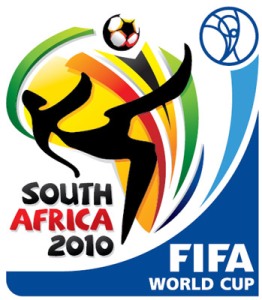 The start of the Fifa football World Cup 2010 is now only a few days away, and new educational resources and activities continue to appear online.
The start of the Fifa football World Cup 2010 is now only a few days away, and new educational resources and activities continue to appear online.
Among my favourites from the new material is the Teachers TV video programme ‘Rainbow Nation 2010′. This short documentary focuses on the history and people of South Africa, the host nation, in the period of build-up towards the competition finals. Another programme ‘Cape Talent’ presents interviews and profiles of a number of South African citizens excited about the forthcoming tournament, including Bishop Desmond Tutu.
Another excellent production is the Oxfam resource ‘Bring on the world’, a sequence of activities for pupils aged 9-11 on themes of world cup football and world trade.
This blog post supplements my earlier post ‘World Cup football’. Now its almost time to take a few personal hours to watch some of the fine football skills displayed on TV for the benefit of a worldwide audience. Enjoy. I know I shall.
MoreLast week the annual official Eurovision Song Contest took place in Oslo. But for those of us involved in Education, online school-focused events offered a great opportunity for young people to learn more about the culture of other countries and show off their own performance skills.
The ‘Eurodance 2010′ project brought together 26 schools in Scotland, the UK and the rest of Europe. Scottish participants included the children of Hallglen Primary and Larbert Village Primary in the Falkirk area. The project began in March. Each school introduced themselves to the other contestants by posting details of their class on a bog, and committed to perform a traditional dance from their country for the competition. The children practised their dances and filmed their final performances. These videos were posted online, to enable all the schools to watch the completed performances and score each school. The scores were collated and the winner identified, and the winning school in Cyprus was rewarded with a trophy. Pupils greatly enjoyed taking part and learnt a lot from the experience. The videos of dances from many regions of Europe are a window into the cultral life of those countries, and are online for us all to appreciate.
‘Schoolovision 2010′ is this year’s version of the successful singing competition pioneered last year by Yester Primary School in East Lothian. 34 schools in Europe participated this year, with the winners being from Iceland. Their blog has videos and details of the songs and schools. A BBC Scotland news story ‘Abba hit wins junior eurovision’ provides details.
Both the above projects were part of the e-twinning initiative which supports electronic communication links and partnerships between schools in Europe.
MoreThe Early Years team at Learning and Teaching Scotland has hosted an international online discussion about early childhood curricula, parental involvement, etc. Participants from Poland, Romania, Iceland, Sweden, Italy and Serbia joined their Scottish hosts for the Glow Meet. This week’s ‘Times Education Supplement Scotland’ has a story about this first summit event.
More
Find us on